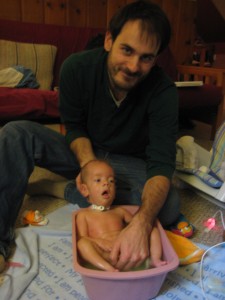Taking on Lucas’s hypotonia (Dec. 14)
Before Lucas was born we had never heard the word “hypotonia”, nor had we ever really contemplated the concept of “low muscle tone”; then, suddenly, it was something we were talking about all the time. At birth and for the first few weeks of his life Lucas hardly moved at all, and his body was like a rag doll, totally floppy. In his first few days of life we were told that he likely had a bad infection and that once the antibiotics kicked in he would snap out of it. But the days passed and we came to realize, along with the doctors, that Lucas’s condition was much more serious than an infection. In the weeks and months that followed the neonatologists and other specialists performed numerous tests and explored various theories of what might be ailing Lucas, but in the end the only diagnosis they could come up with is the name for his most acute symptom: hypotonia.
Lucas has gotten stronger as he continues to grow (if we haven’t mentioned it, he’s up to 9.5 pounds!) But as we’ve discovered, muscle strength is very different than muscle tone, and the physical therapists have been persistent in pointing out just how low Lucas’s muscle tone is. Dan, the physical therapist that comes to our home once a week, gave us perhaps the best simple definition of muscle tone: the normal resting state of muscles. For Lucas, having low tone means that there’s very little tension in his muscles, and therefore he has to work that much harder to move his arms and legs or hold his head up, among other things. A longer explanation of muscle tone can be found on this website, and here’s another basic definition taken from Wikipedia:
“True muscle tone is the inherent ability of the muscle to respond to a stretch. For example, if you quickly straighten the flexed elbow of an unsuspecting child with normal tone, the biceps will quickly contract in response (automatic protection against possible injury). When the perceived danger has passed, which the brain figures out really quickly once the stimulus is removed, the muscle then relaxes, and returns to its normal resting state… The child with low tone has muscles that are slow to initiate a muscle contraction, contract very slowly in response to a stimulus, and cannot maintain a contraction for as long as his ‘normal’ peers. Because these low-toned muscles do not fully contract before they again relax (muscle accommodates to the stimulus and so shuts down again), they remain loose and very stretchy, never realizing their full potential of maintaining a muscle contraction over time.”
 Lucas’s low muscle tone is the likely cause of most of the challenges he’s dealing with. He’s unable to feed orally because the low tone in his face makes it difficult him to hold his chin up and have a strong suck for an extended period of time (he’s also still developing his swallow reflex). He was unable to breath off the ventilator in his first few months of life – and therefore the necessity of tracheostomy surgery – because the low tone in his upper airway inhibits his ability to keep that airway open. Even with the trach he needs the ventilator more often than not because his low tone makes for shallower breaths (less ability to fully contract his diaphragm.) The low tone in his trunk makes it difficult for him to sit upright without braces, even at a 45 degree angle.
Lucas’s low muscle tone is the likely cause of most of the challenges he’s dealing with. He’s unable to feed orally because the low tone in his face makes it difficult him to hold his chin up and have a strong suck for an extended period of time (he’s also still developing his swallow reflex). He was unable to breath off the ventilator in his first few months of life – and therefore the necessity of tracheostomy surgery – because the low tone in his upper airway inhibits his ability to keep that airway open. Even with the trach he needs the ventilator more often than not because his low tone makes for shallower breaths (less ability to fully contract his diaphragm.) The low tone in his trunk makes it difficult for him to sit upright without braces, even at a 45 degree angle.
Physical and occupational therapy, along with early intervention (speech and language therapy and other forms of developmental support) will hopefully help Lucas a lot in his path forward. Already we see the results of having worked with some pretty amazing therapists, and we’re applying for early intervention services so that he can continue to receive a variety of therapies, stimuli, and support. Ultimately we plan to learn all we can about Lucas’s condition and these various therapies so that we can spend lots of time working with him on our own.
It’s likely that the hypotonia is related to the brain hemorrhage that Lucas suffered at birth, though no one knows why Lucas had extensive bleeding – not just in his brain – when he was born. Yet according to his doctors the grade II and grade III bleeds in his brain usually would not lead to such severe hypotonia, and therefore they kept searching for some other condition or syndrome to attach to Lucas. In the end none was found, and thus at this point when we’re asked about Lucas’s disability our best answer is that he’s hypotonic. In fact, he could be said to have Benign Congenital Hypotonia, which is basically a diagnosis of exclusion (incidentally, he has a onesie that says “Stumped the entire medical establishment and proud of it!” which we decided not to put on him in the NICU so the doctors wouldn’t feel bad.)
The good thing, of course, is that Lucas is getting better and not worse. Were he to have some sort of neuromuscular condition then it would almost certainly be degenerative. His hypotonia, on the other hand, is associated with the central nervous system, and thus as his brain functions continue to improve and recover from the bleed there’s reason to believe that his low muscle tone will also improve. The hand-mouth-giraffe coordination he exhibited the other day (see blog entry below) is just one example of that steady improvement.


Comments (4)
Chelsea
November 20th, 2010 at 1:01 am
Wow, you guys. Your family is amazing and inspirational. And even with the challenges, you can find the humor- I love the “Stumped the entire medical establishment and proud of it!” onesie. That is fabulous. :D
Spencer
December 16th, 2009 at 8:48 pm
Lucas is lucky to have two parents that are incredible people who know what it takes to overcome challenges. Much love, s
Sarah
December 15th, 2009 at 1:20 am
You guys are truly amazing. I hope you are getting at least a little respite for yourselves, a quick walk, yoga, anything to help you keep going. Much love, sarah
Sammie & Dan
December 14th, 2009 at 11:56 pm
Thanks for the explanation and sharing the story of Lucas’ amazing and steady improvement! And for sharing the story of his remarkable parents!
Leave a reply